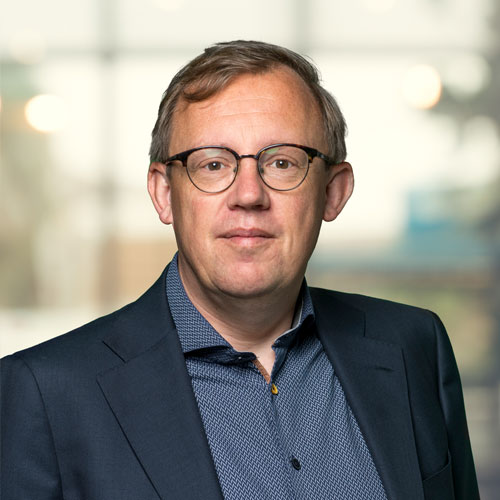
Frank Phillipson

Frank Phillipson is senior wetenschapper en hoogleraar Computational operations research aan de Universiteit Maastricht, gespecialiseerd in de optimalisatie van telecom- energie- en logistieknetwerken. Onze werkzaamheden zijn momenteel vooral gericht op het vinden van nieuwe berekeningstechnieken voor optimalisatie en machine learning met de quantumcomputer.
Leerstoel
Computational operations research (Maastricht University).
Onderzoeksgebieden
Veel problemen op het gebied waar operations research en data science samenkomen, zijn van nature lastig op te lossen. We zien dergelijke problemen in verschillende domeinen, zoals netwerkoptimalisatie en -planning in ICT-netwerken (onderliggende smart grids), logistiek en transport, energienetwerken en -planning bij industriële processen en bij Defensie-activiteiten.
Als er ook nog onzekerheid heerst rond de gebruikte gegevens en de realisaties, wordt het nog lastiger om deze problemen op te lossen. Bovendien worden de systemen die aan deze problemen ten grondslag liggen steeds complexer en onderling afhankelijker en evolueren ze in de loop van de tijd, waardoor de behoefte aan (meer) gedecentraliseerde of zelfs zelfoptimaliserende, adaptieve methoden toeneemt. Het is belangrijk om het juiste evenwicht te vinden tussen (volledig) decentrale en centrale aansturing bij deze systemen; decentrale aansturing kan leiden tot suboptimale oplossingen, terwijl centrale aansturing een gebrek aan informatie met zich kan meebrengen. Voor adaptieve methoden moeten de berekeningstijden worden verkort, want zowel systemen met menselijke interactie als zelfsturende systemen zijn bij onzekerheid niet adaptief (genoeg) als de berekeningstijden lang zijn. Om dit te bereiken, moeten we alle wiskundige tools die we kunnen bedenken, combineren. Wat betreft algoritmes moeten we methoden en oplossingsbenaderingen uit de operations research en data science combineren, bijvoorbeeld exacte methoden (zoals het oplossen van integere lineaire programmeerproblemen met niet-lineaire programmeerproblemen), probleemgebaseerde heuristiek, hyper- of metaheuristiek, bio-based heuristiek, machine en deep learning (bijv. reinforcement learning) of stochastische of robuuste optimalisatie. Om de kracht en de uitlegbaarheid van deze methodes te versterken, moeten we ze gecombineerd gebruiken. Internationaal wordt dit ook wel Beslissingsintelligentie genoemd, een discipline waarbij gegevenswetenschap wordt aangevuld met theoretische kennis uit andere gebieden, zoals de beslissingstheorie en bestuurskunde.
Dit moet allemaal worden gezien in het kader van de evolutie van computertechnologie. De beschikbaarheid van snellere CPU's, de opkomst van GPU's en cloud computing hebben al veel kansen opgeleverd. Deze ontwikkeling zet door in de richting van quantum computing, wat zou kunnen leiden tot een spectaculaire versnelling op het gebied van heuristiek en exacte optimalisatietechnieken: in de nabij toekomst op de adiabatische quantumcomputer, met behulp van quantum annealing, gevolgd door de gated quantumcomputer, die naar verwachting superieure quantumprestaties zal leveren door middel van het zoekalgoritme van Grover en de afstammelingen daarvan.
Belangrijkste publicaties
- ‘Data granularity and the optimal planning of Distributed Generation’, L. Kools and F. Phillipson, Energy, 2016.
- ‘Machine learning in the quantum era’, N.M.P. Neumann, F. Phillipson, R. Versluis, Digitale Welt – Quantum Computer special, 2019
- ‘Mathematical Formulation of Quantum Circuit Design Problems in Networks of Quantum Computers’, J. Mulderij, R. van Houte, T. Attema, I. Chiscop, F. Phillipson, Quantum Information Processing, vol. 19, 141, 2020
- ‘Power network optimization: a quantum approach’, G. Colucci, S. van der Linde, and F. Phillipson. IEEE Access (2023)
Den Haag - New Babylon
Anna van Buerenplein 1
2595 DA Den Haag
Postadres
Postbus 96800
2509 JE Den Haag